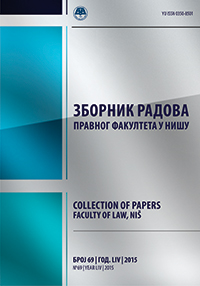O DVOJBAMA NOVOG HRVATSKOG STEČAJNOG ZAKONA ‒
pokretanje kaznenog postupka kao
diskriminatorska prepreka za ostvarivanje
pravnog statusa stečajnog upravitelja
ON CONSTITUTIONAL DOUBTS ABOUT NEW CROATIAN BANKRUPTCY
LAW: INITIATION OF CRIMINAL PROCEEDINGS AS AN OBSTACLE TO
EXERCISING THE LABOR LAW STATUS OF THE BANKRUPTCY TRUSTEE
Author(s): Dejan Bodul, Sanja GrbićSubject(s): Law, Constitution, Jurisprudence
Published by: Правни факултет Универзитета у Нишу
Keywords: employment; initiation of criminal proceedings; bankruptcy trustee
Summary/Abstract: A number of regulations prescribe general and specific requirements that a person (exempli causa, the bankruptcy trustee, lawyers, judges, notary public, sports staff) must observe in order to perform its function. This becomes even more important because the Bankruptcy Act (OG, 71/15) states that one of specific conditions for performing the function of a bankruptcy trustee is that he has to be worthy of public trust, and he is not considered worthy if criminal proceedings are initiated against the trustee. The thesis of this paper is whether such a solution is in accordance with the Constitution of the Republic of Croatia (OG, 56/90, 135/97, 8/98, 113/00, 124/00, 28/01, 41/01, 55/01, 76/10, 85/10 and 05/14) and the EU Convention for the Protection of Human Rights and Fundamental Freedoms (OG-IT, 18/97, 6/99, 14/02, 13/03, 9/05, 1/06 and 2/10), given that everyone is presumed innocent and is not to be found guilty of any criminal offense until proven otherwise by a final court judgment (Art. 28 of the Constitution of Croatia and Art. 6. par. 2. of the Convention). The complexity of the research subject and set tasks have dictated the choice of method so that we used a methodological approach that encompasses the study of domestic and foreign literature, the relevant legal provisions, and analysis of domestic and foreign legal practices. In the paper, we shall also analyze the practice of the European Court of Human Rights in proceedings under Art. 6 (Right to a fair trial) and Art. 14 (Prohibition of discrimination) of the Convention, because we assume that it can be crucial for understanding the thesis which is based on the case law of the European Court of Human Rights and the European positive law. In that sense, this work is intended to point out the vagueness of the existing legal provisions, by focusing on certain de legeferenda solutions.
Journal: Зборник радова Правног факултета у Нишу
- Issue Year: LV/2016
- Issue No: 73
- Page Range: 117-136
- Page Count: 20
- Language: Croatian

